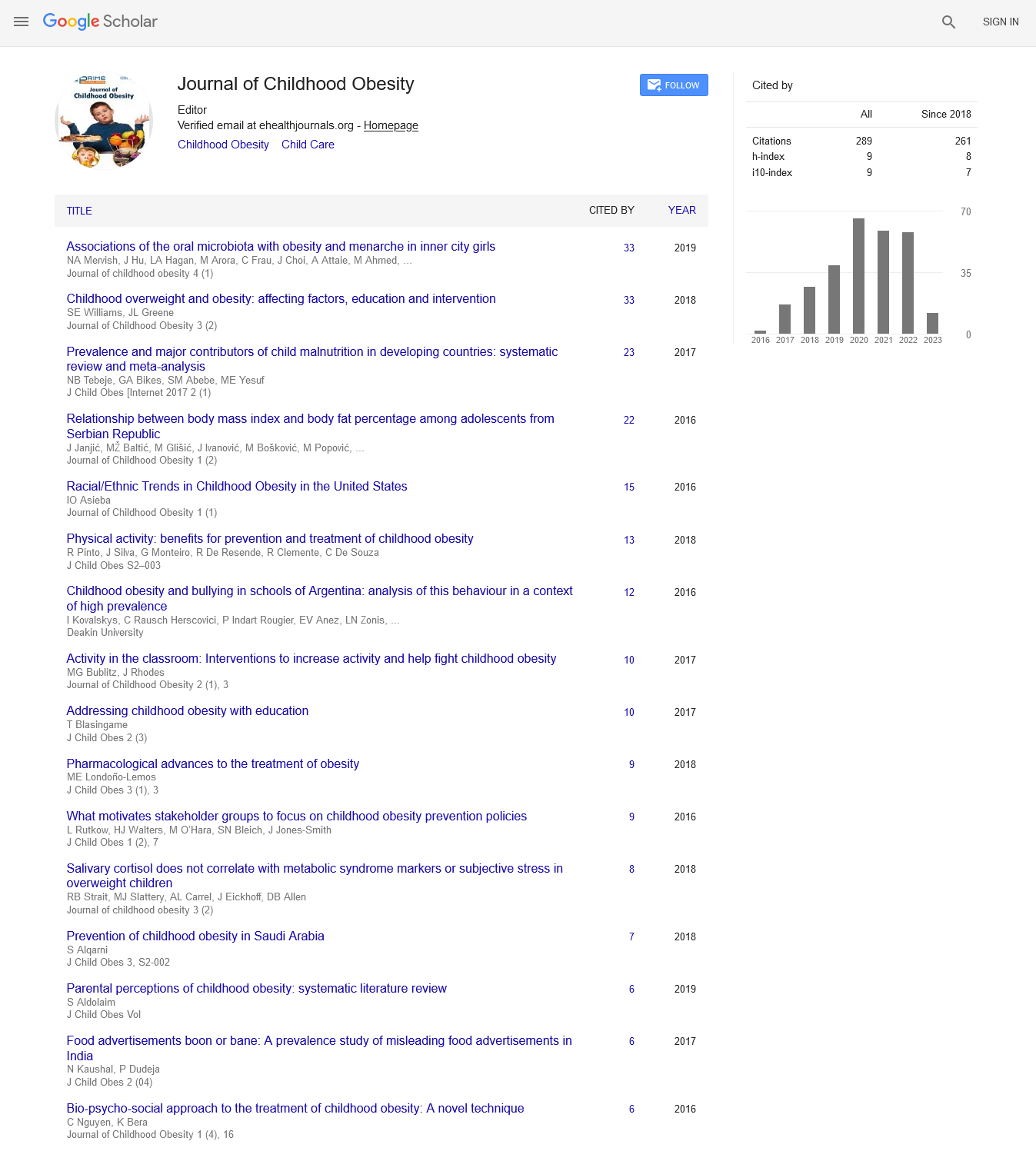Commentary - (2023) Volume 8, Issue 6
Nurturing Well-being Comprehensive Approach to Weight Management in Children
Andrew Davis*
Department of Health Sciences, Tulane University, United States of America
*Correspondence:
Andrew Davis,
Department of Health Sciences, Tulane University,
United States of America,
Email:
Received: 29-Nov-2023, Manuscript No. ipjco-24-18888;
Editor assigned: 01-Dec-2023, Pre QC No. ipjco-24-18888 (PQ);
Reviewed: 15-Dec-2023, QC No. ipjco-24-18888;
Revised: 20-Dec-2023, Manuscript No. ipjco-24-18888 (R);
Published:
27-Dec-2023, DOI: 10.21767/2572-5394-23.8.54
Description
Childhood obesity has reached alarming proportions globally,
posing significant health risks for children. Effective weight
management in children is crucial not only for immediate
health but also for preventing a range of chronic conditions
in adulthood. This article explores the multifaceted aspects of
weight management in children, emphasizing the importance
of a holistic approach that encompasses nutrition, physical
activity, and a supportive environment. The World Health
Organization identifies childhood obesity as one of the most
serious public health challenges of the 21st century. The
prevalence of obesity in children has increased significantly
in recent years, with environmental, behavioral, and genetic
factors contributing to this concerning trend. Obesity
during childhood sets the stage for a range of health issues,
including type 2 diabetes, cardiovascular diseases, and
psychological challenges. A balanced and nutritious diet forms
the cornerstone of weight management in children. Parents,
caregivers, and educators play pivotal roles in shaping a child’s
eating habits. Here are key principles for fostering a healthy
approach to nutrition Encourage a diet rich in fruits, vegetables,
whole grains, and lean proteins. Emphasize portion control to
avoid overeating and teach children about the importance
of consuming a variety of foods for optimal nutrition. Sugary
beverages and snacks contribute significantly to excess calorie
intake. Encourage water as the primary beverage and limit
the consumption of sugary drinks and snacks high in added
sugars and unhealthy fats. Eating together as a family fosters a
positive attitude toward food and encourages healthier eating
habits. It provides an opportunity for parents to model good
eating behaviors and engage in conversations about nutrition.
Schools play a crucial role in nutrition education. Implementing
programs that teach children about the nutritional value of
foods, reading food labels, and making informed choices
empowers them to make healthier decisions. Regular physical
activity is essential for weight management, promoting overall
health and well-being. The WHO recommends at least 60
minutes of moderate-to-vigorous physical activity for children
daily. Here’s how to encourage an active lifestyle engage children
in activities that are suitable for their age and developmental
stage. This could include active play, sports, dance, or simply
walking and biking. Excessive screen time, including television,
computer, and video games, is associated with sedentary
behavior. Set limits on screen time and encourage outdoor play
and physical activities. Incorporate physical activity into family
routines. Whether it’s a weekend hike, a bike ride, or a family
game of soccer, making fitness a shared experience reinforces
its importance. Encourage involvement in community sports or
recreational programs. This provides additional opportunities
for physical activity and promotes social interaction. Creating
an environment that supports healthy living is fundamental
to successful weight management in children. Here are
key components of a supportive environment Parents are
instrumental in shaping a child’s habits. Involvement in meal
planning, grocery shopping, and participating in physical
activities together strengthens the family’s commitment to
a healthy lifestyle. Encourage and praise positive behaviors.
Recognize and celebrate small victories, whether they are
related to healthy eating habits or increased physical activity.
Schools play a vital role in shaping a child’s environment.
Implement policies that support nutritious meals, provide
opportunities for physical activity, and foster a positive attitude
toward a healthy lifestyle.
Acknowledgement
None.
Conflict Of Interest
The author declares there is no conflict of interest in publishing
this article.
Citation: Davis A (2023) Nurturing Well-being Comprehensive Approach to Weight Management in Children. J Child Obesity. 8:54.
Copyright: © 2023 Davis A. This is an open-access article distributed under the terms of the Creative Commons Attribution License, which permits unrestricted use, distribution, and reproduction in any medium, provided the original author and source are credited.

